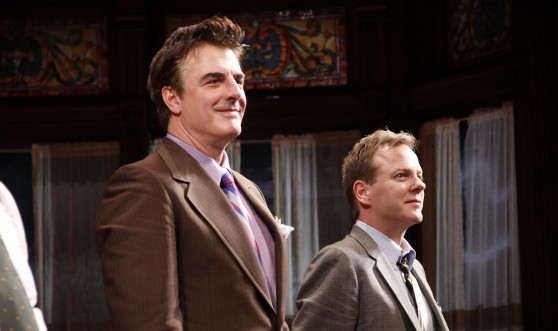That Championship Season

Kiefer Sutherland and Brian Cox appeared on The Leonard Lopate Show last month to discuss the play, and I’d forgotten about all the subplots in the production — among them that Jason Patric’s father wrote the play; that Patric pulled the production together in large part, and took the role of Tom; and of course that whole ancient, but still considerable, history between Patric and Sutherland vis-à-vis Julia Roberts.
In fact, I’d forgotten who else was in it besides Jim Gaffigan (who I hope has managed to ad-lib a Hot Pockets reference into the show somewhere) and Chris Noth, whose resulting absence from The Good Wife has led to shoot-around gymnastics of “put Elaine behind a mattress on Seinfeld to hide Julia Louis-Dreyfus’s pregnancy” proportions. Doesn’t that show shoot primarily at Silver Cup in Queens? So couldn’t Noth take a car service across the river to shoot one scene, the one in which his character has won the state’s-attorney race — a plot that took over a season to construct? That “here’s the back of his head as we pan away” nonsense at the victory party was so budge, I thought maybe it was supposed to be a joke.
Quite a cast, then, but Sutherland and Cox made the play sound like quite a read on its own, and I figured I probably wouldn’t get to see the production, so I picked up a copy last week. It’s not as powerful as I’d expected, based on their remarks; it probably plays better than it reads, but it’s nearly 40 years old, and the casual (except not) bigotry feels clumsy. Miller employs, and/or reflects, that bigotry to make his points and to amplify the play’s climactic reveal, which revolves around an offstage character who’s only referred to by the others. Possibly as a result of that, possibly because the writing is at times designed more for the acting of it than for its own narrative sake, that climax underwhelmed me initially. Obviously it would arrive in the third act, obviously it would contain Martin somehow, but then it arrives and it’s just…obvious.
Now that I’ve sat with it for a few days, though, it works for me. The play is about the compulsion to mythologize the past in the face of an anxious, unsatisfying present, and the more era-specific references to the play’s particular present, 1972, sometimes work and sometimes thud. But the key exchange of information between the characters and the audience that at first is a head-scratcher — “Coach ordered the kid to foul an opponent? This is the broken bone they all walk around on?” — goes to that theme nicely. Not only do the characters dwell in the rosy glow of a high-school triumph long past, but the corresponding shame is also made more dramatic and wounding than it really is. I can’t swear that that’s the intent, but that’s the result: all the stories we tell ourselves about ourselves, who we were, are lies.
But, as I said, I think the center must hold better onstage than it does on the page. Cox and Sutherland mentioned several times that Miller was an actor himself, and wrote for actors, and actors love that sort of scripting, because it gives them both structure and room. As a reader, I should have heeded those mentions more closely, because the on-the-nose bits — which is to say, most of the play: the endless back-and-forth about Phil’s mayoral-campaign loyalties, Tom’s Shakespearean-fool shtick, George ralphing into the championship trophy — no doubt go over better in the delivery. (In theory. In practice, according to Ben Brantley’s over-it review, performances can magnify the play’s creakiness instead of lubricating it.)
I’ve read worse, certainly — preachier, more boring — but I hoped for better.
Tags: Brian Cox brrr it's cold in here there must be some Brantley in the atmosphere Chris Noth Jason Miller Jason Patric Jim Gaffigan Julia Louis-Dreyfus Julia Roberts Kiefer Sutherland Leonard Lopate plays Seinfeld The Good Wife TV





I got to see this a few weeks ago and I enjoyed it. Although I found myself struggling with the dated feeling it had. All of the guys were great in it.
Miller directed the 1982 film adaptation as well. I saw it once, decades ago. I remember expecting it to be better, with the material and that cast (very well-chosen actors like M. Sheen, B. Dern, P. Sorvino, who were good and in-demand but were not locked into iconic prior roles, so they could disappear into these Everyschlubs). The film seemed to me another of those filmed plays in which material that might have worked on the stage was overwrought and too obviously “diagrammed” to play well in a medium with very different rules of closeness and freedom.
I did not see or know until now about the later TV remake in which Sorvino moved up to the role of the old coach. It looks to have a good cast of “right types” too (Vincent D’Onofrio, Tony Shaloub, Gary Sinise).
@Todd, I’ll have to look for the TV adaptation — any idea if it’s on Netflix or Hulu?
@Sarah: I don’t know, but there is a DVD for as little as $3 at Amazon, and the IMDb page has a “Watch it on Fancast” banner, so it seems likely.